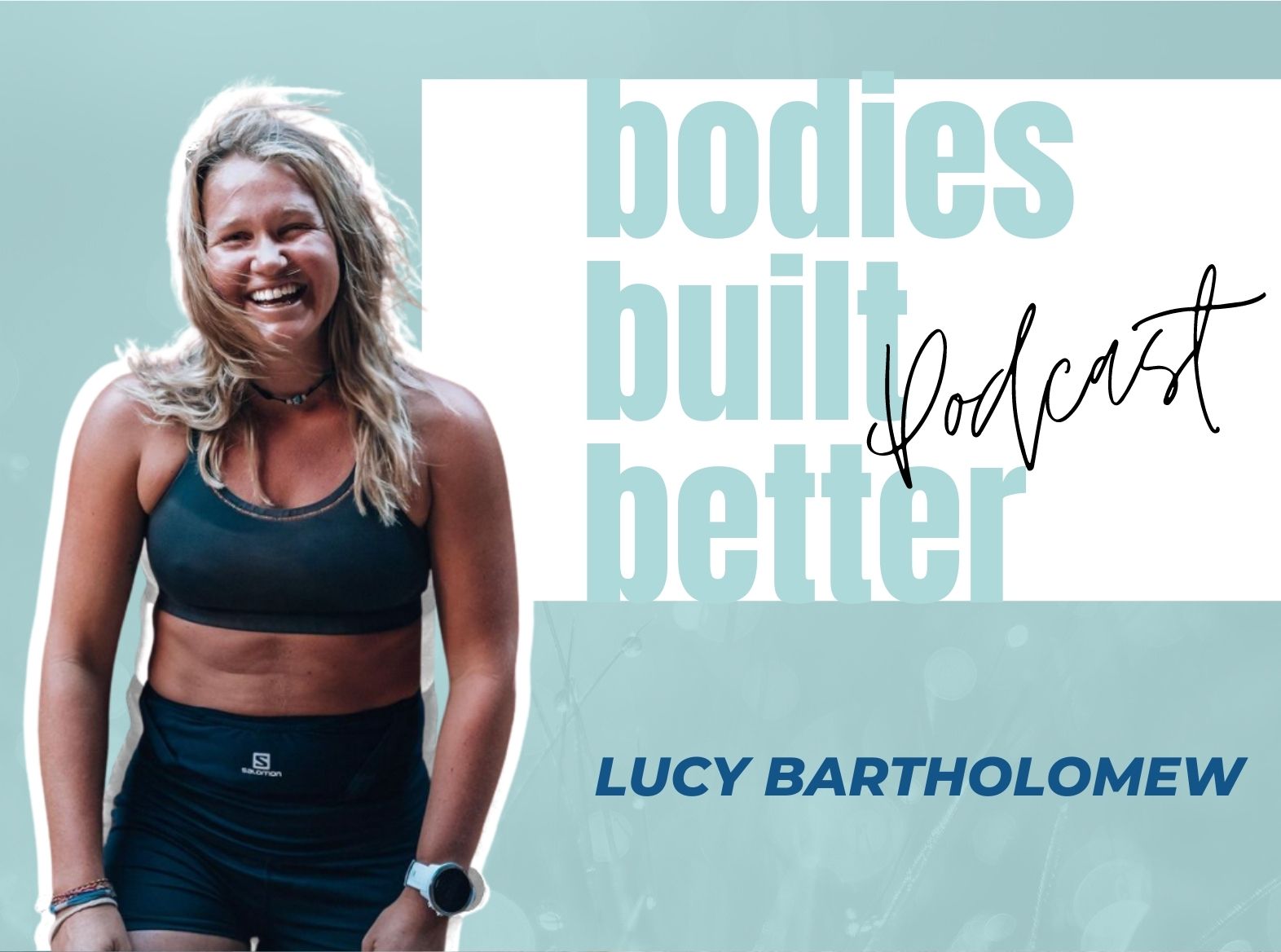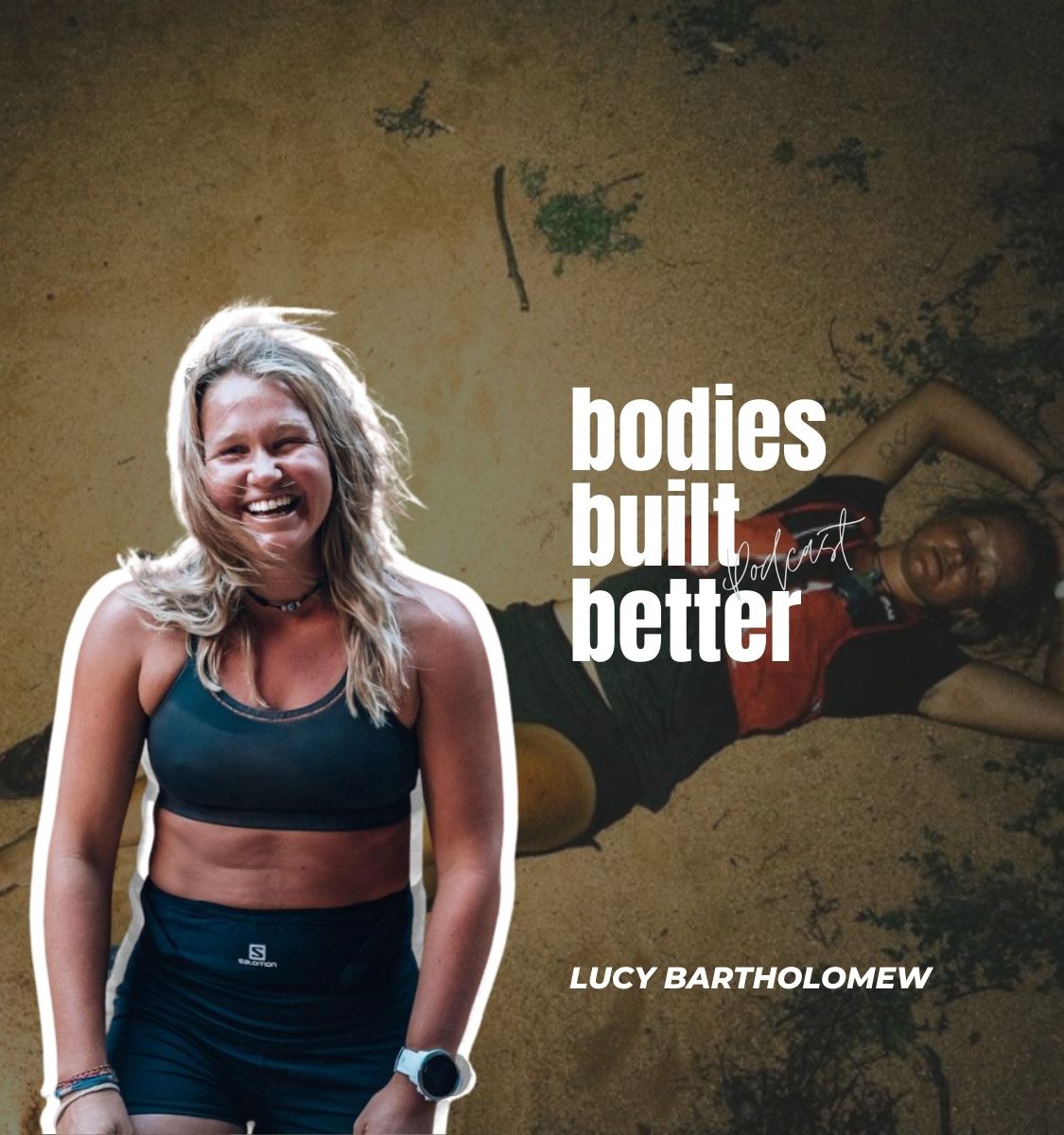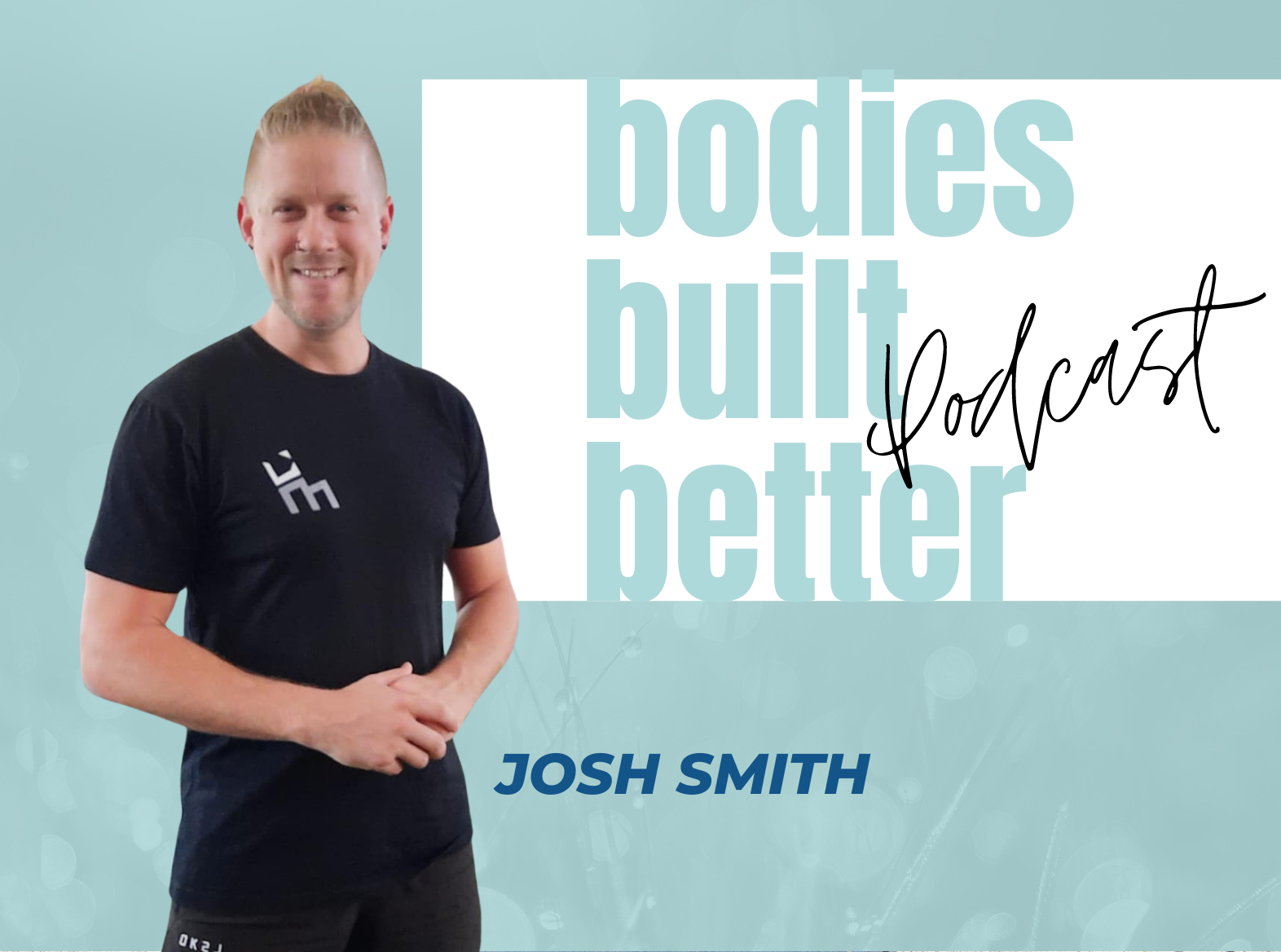Jackie 2:31
Lucy, thank you so much for chatting with me today. Welcome to the Bodies Built Better podcast.
Lucy Bartholomew 2:37
Thanks for having me. I’m honoured.
Jackie 2:39
Oh, super exciting to have you on, I’m a big fan of yours. You’re running royalty. And I recently watched your documentary Running Out, which was just phenomenal. And I mean, it’s beautifully done. It’s raw. It’s real. It’s honest, it’s you, it looks tough. All of the emotions in and Brian Hines has done an incredible job of filming and documenting it. So congratulations on that. What inspired you to run the Larapinta Trail but also document it?
Lucy 3:17
Yeah, it was. Well, thank you. First of all, I’m sure Brian will be absolutely stoked to hear that, he put his time, effort, soul and energy into it. It’s awesome, I think, for him to see the rewards of that. Whilst the movie’s about me or about that round that I did. It was a huge effort for everybody. So the Larapinta idea came to bat when we went into lockdown. I think a lot of people were kind of I mean, people were running Ultras in their backyards on their decks. And I wasn’t someone who was gonna just run around the block or around my backyard a million times. But I was keen to kind of see an opportunity in a time that seemed really challenging for me. And I wanted to go back to, I guess why I started running in 2017-2018. I had amazing years of racing. And then in 2019, and a little bit of 2020, what was able to race wasn’t very good–I thought in my opinion, and I wasn’t loving it. And so we went into lockdown. And I kind of saw that as you know, I was relieved. I thought, oh gosh, it looks good. I don’t have to race. I don’t have to travel. I can just kind of reset and refocus and partway through 2020 […] I just watched it with my dad. He said to me, “you know Lucy, I think you just need to go back to why you started running, and you didn’t start running to race, centred to have expectations and to you know, try and win things. You did it because you love spending time with people.” We’d go away and we’d see new places and I think that I kind of just kind of lost that reasoning, I was more about like, “No, this is what I’m expected to do. And I must win. And I need to put a bid on and be the fastest and times and splits.” And me and Dad talked about the Larapinta Trail because he has always been keen to hike it. And when it kind of came about, I met Josh and Brian in January in 2021. And I was like, oh, I’ve got this very small idea, a seed of an idea in my mind, maybe for the future. And I really want to get it captured, because I’d love to put sell for Sol and my sponsor put Australia on the map. And as an Australian athlete, I saw a really great opportunity to do that. And, yeah, I said to Josh, and Brian, you know, if there was a chance of doing it this year, I might do it. And they would kind of have interest in it, and the world aligned in March, and we were all able to get in a car, take a plane and get to Alice Springs to embark on a journey that was much, much grander than we expected. And just way more fulfilling than I ever could have envisioned.
Jackie 6:12
That’s crazy. You say March, and you did in April? Well, was there any preparation altogether?
Lucy 6:21
No. And that’s the thing. I met Josh and Brian in January on a hike in Tasmania. So I spent 10 days with them hiking there. And we kind of naturally got along. And we spent a lot of the heart just kind of talking about different dreams, whether it was videography, creativity and my like running and athletics and storytelling. And we kind of like we all just, you know, you meet those people in life that I felt like I’d known them for a very long time. And I just trusted them. And then when I said to Salomon, “I want to do this project.” and they were like, “Yep, cool. Like, you can do that. When do you want to do [it]?” and I was like, kinda now. And they’re just like, “okay, cool. And who’s your team?” And I was like, “wow, I think these guys?” and they’re like, “Okay, like, what are they? What’s their stuff? Can you tell us about them?” And I was like, “I don’t really know. But I know, they’re really good dudes. And they can hike in Tasmania super strong.” And, you know, just as I [got] back to them, they backed me into this and kind of went, “yeah, we’ll come crew for 54 hours through the desert and spend, you know, six days on either end in the car with you? No worries.”
Jackie 7:30
Well, that is sensational. Did you guys–I mean, on paper, it looks hard. Did you anticipate how challenging it actually would be?
Lucy 7:44
I think I thought the biggest challenge was going to be the distance. I thought, you know, that’s obviously a really long way. But what turned out to be the challenge, the biggest challenge was kind of the mental and emotional toll that running for that amount of time [that] takes on you. And I didn’t envision myself being alone for so long. Initially Josh, who’s a great runner, was going to join me for about 100 kilometres of it. And I had mainly said, “Okay, during the night sections, that would be awesome.” But what we found is that Josh is an amazing road runner, but he’s not used to really gnarly trails, which is barely running, it’s more hiking and just like speed walking. And so he didn’t feel very comfortable. And he was having a few niggles in his body from the few records we did do. So the challenges came from just being I hadn’t prepared for like, full nights by myself and having to navigate and eat and drink, and do all the things by myself. And I had to just kind of really be present enough and on it to be able to look after myself. I mean, the running was kind of the easy bit. My body knows how to do that. That along with the boys having to work out where they could drive to to get access to me and what time I was going to be there. Like we were just pulling numbers from the middle of the air and just being like, “Yeah, I mean, that could take like, maybe 10 hours, maybe more, maybe less,” but it was just like a big guessing game because there’s numbers on paper, but they mean nothing until you see what the track actually looks like.
Jackie 9:29
Yeah, absolutely. And tell us about some of the tracks, because you know the conditions and the terrain. I mean, you’re like wading across a river at times. Tell us about that.
Lucy 9:45
Yeah, so we got up to the Northern Territory just after they’d had an immense amount of rain. So what we were expecting was this dry red soil land that we all know the Northern Territory as was actually incredible. lush and green, which was just incredible to see. And when you see it in a film, it’s not what people expect. And that’s what a lot of the international viewers have said. They kind of said, “I didn’t know that spot was in the middle of Australia.” And I said, “well, most of the time, it’s not.” But yeah, because of that, it meant that all the grass and stuff were sprouted. And because of the rain, they’d grown really high. And then because of COVID, people haven’t been walking the Larapinta. So it wasn’t very clear. So when we started, the first bit of the track was out Mount Sonder, which is kind of a day walk and a few, quite a few people have been doing that. But it became very apparent very early that the track was pretty overgrown, like the grasses had grown so high so quickly that they were covering a lot of the markers and the trail arrows. And then because of the rain, the river beds, which are just not used to having this abundance of water, filled up rapidly. And so what was one section in the place was referring to was meant to be this two kilometre section in Hugh Gorge, which is normally bone dry. And for me, I could actually swim so I swam for about two kilometres breaststroke and freestyle up the gorge, which was an awesome thing to experience, but it’s really challenging and some of the trail markers were underneath the water. So I had to put my head torch on underneath to see if it would reflect and it just kind of added this extra level of–I get lost in a supermarket. So maybe Larapinta with these conditions was extremely challenging for me to try and navigate, especially on my own.
Jackie 11:56
Well, I mean, yeah, it was 231 kilometres, you ended up running 215 because you got lost.
Lucy 12:06
Yes, it was a half marathon of their navigational challenges.
Jackie 12:11
That is incredible. Like in those moments, do you know you’re off course and if you do, like do you know how much off course?
Lucy 12:24
No, so it was it was kind of I found that as I started and got into the track I realised that there was like this rhythm to it like the way it kind of meandered and moved and followed riverbeds or systems or, and you kind of got a feeling of like, this is I don’t know you just kind of it’s really weird, I guess I like to refer to as like the desert spirit of black, it felt like you knew if you were on it, but then you knew if you got off it as well. And I I had it on my phone which was probably my predominant use of navigation. I had like a compass and map in my backpack, but my God if that if it comes to that we’re in really bad. I also had it on my watch, but that’s quite hard to navigate off. So I yeah, I guess you know, I got probably the furthest I got off course was about a kilometre. Which, because I was running parallel to it, it made it really hard to cut across. It’s not like grassy land. It’s like shrubbery, spiky bushes, and gorges and cliffs and stuff. And the worst that I got off course was in the second night that I was starting to hallucinate that I was quite tired and I was climbing up a mountain […] with my hands grabbing onto rocks and like pulling myself up and because the Larapinta is a well known walk and it normally takes hikers 14 days and they do it with these big packs. And I know many people that have done it, varying from ages 70 to 12. I was like, sure, surely people aren’t doing this, but it just doesn’t feel right. like it’s a pretty well renowned walk that’s not too demanding if you do the 14 days and when I kind of took a moment to be like, just stop Lucy, like you’re in the middle of the night and it’s one o’clock in the morning. This is your second night, you’re seeing people that aren’t there, just have a look at your phone. And I remember looking and being like, oh, there’s like this beautiful zigzag just a little to my left that just meanders its way up the mountain where I’ve tried to line it up a scree slope, which is incredibly dangerous.
Jackie 14:43
Yeah. Because at once, what is that moment where you had a spot tracker and he got in touch with the guys and said “she’s way off course”?
Lucy 14:56
Correct. So that was when I got a message. I did have reception at the top of that mountain and my phone went off, and it was a message that had gone to Brian and Josh from the person who was tracking my spot tracker. He was my emergency response person. And he said, “Lucy’s way off course.” That part of the mountain that she’s on is like, incredibly scree and spiky bushes and lack. It’s kind of degrading. And, he said […] “I’m moments from calling a helicopter, but if she makes it off this, she’s going to be incredibly ripped up, because the terrain on that side of the mountain is so gnarly.” And obviously, I made it down and I got to Josh and Brian, who I’ll never forget their faces. They’ve just been like, “Oh, my God, she’s alive.” And then it was kind of like, “What have you broken?” And I was like, “I’m all good. I just smashed my phone. But that’s about as bad as it got.” […] I think after that, they’re like, “Wow, okay. She’s just obviously, completely, not bothered or unfazed by it. We’ll just let it continue.” And, yeah, [if] [she] can get through that she can probably get through any of it.
Where to find Lucy
Check out the Film here: Running Out
Website: www.lucybartholomew.com
Instagram: @lucy_bartholomew







